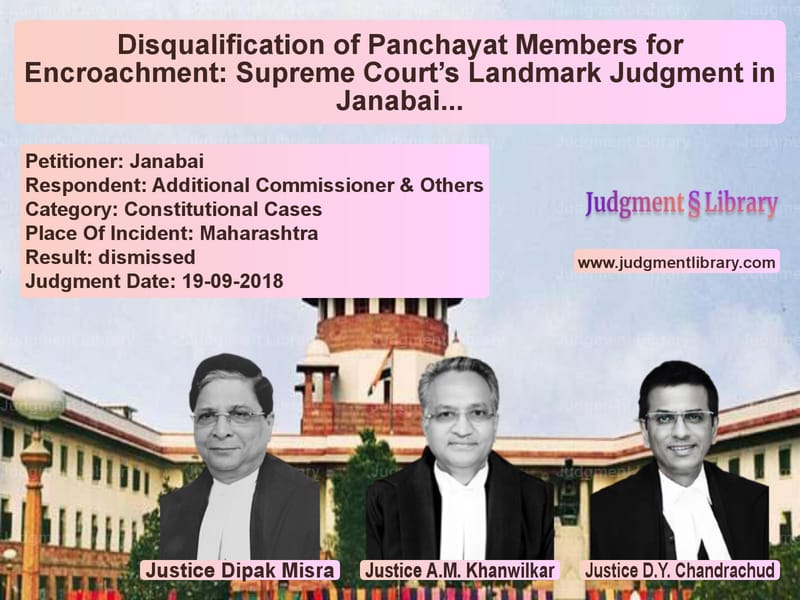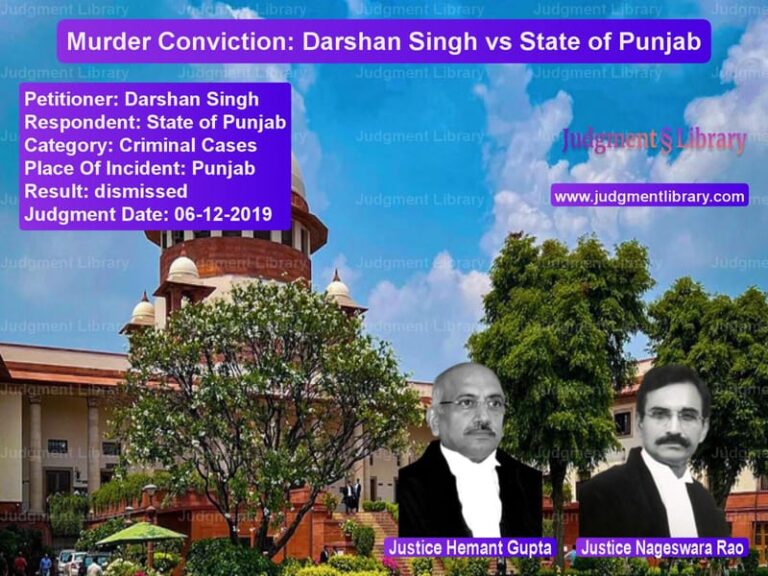Disqualification of Panchayat Members for Encroachment: Supreme Court’s Landmark Judgment in Janabai vs. Additional Commissioner
The Supreme Court of India, in its judgment dated September 19, 2018, in the case of Janabai vs. Additional Commissioner & Others, addressed a crucial legal issue regarding the disqualification of elected members of a Gram Panchayat under the Maharashtra Village Panchayat Act, 1958. The Court examined whether a member could be disqualified for encroachment on government land if the encroachment was done by a family member and not the member personally.
Background of the Case
The case originated when Janabai, an elected member of the Gram Panchayat Kalamba (Mahali), was disqualified for alleged encroachment upon government land. The authorities held that the encroachment had been made by her father-in-law and husband, and that she was using the land. The disqualification was imposed under Section 14(1)(j-3) of the Maharashtra Village Panchayat Act, 1958, which states:
“No person shall be a member of a Panchayat or continue as such who has encroached upon government land or public property.”
The disqualification was upheld by multiple authorities, including the High Court of Bombay. Janabai challenged the decision before the Supreme Court.
Arguments by the Petitioner (Janabai)
Janabai argued that:
- The encroachment was made by her father-in-law and husband, not by her personally.
- The law only disqualifies the person who has encroached upon government land, and it does not extend disqualification to family members.
- The High Court failed to examine the law properly and issued a ruling without proper legal analysis.
- Previous Supreme Court judgments, such as Sagar Pandurang Dhundare vs. Keshav Aaba Patil, supported her case by stating that a member cannot be disqualified for encroachments made by family members.
Arguments by the Respondents (State Authorities)
The State contended that:
- The encroachment had been continuing since 1981 and Janabai was benefiting from it.
- The intent of Section 14(1)(j-3) was to ensure that individuals who encroach upon public property do not hold elected positions.
- Even if the initial encroachment was done by her father-in-law and husband, she was residing on the encroached land and was thus a beneficiary of the illegal occupation.
- Allowing Janabai to continue in office would create a loophole where individuals could circumvent the law by transferring illegal land occupation to family members.
Supreme Court’s Observations
The Supreme Court analyzed multiple aspects of the case, including legal precedents and the intent behind the law.
1. Interpretation of the Term “Encroachment”
The Court noted that the term “encroachment” is broad and does not merely refer to an initial act of illegal occupation. The Court stated:
“Encroachment is not a one-time act but a continuing offense. If a member resides on encroached land, even if it was originally occupied by another person, they are equally responsible.”
2. Personal vs. Family Encroachment
The Court rejected Janabai’s argument that disqualification should apply only to direct encroachers. It ruled:
“If an individual benefits from an encroachment and continues to use the land, they are as much an encroacher as the person who originally occupied it.”
The Court cited the Devidas Surwade vs. State of Maharashtra case, where it had ruled that disqualification applies to those who continue to occupy encroached land.
3. Legislative Intent Behind Disqualification
The Court emphasized that the objective of Section 14(1)(j-3) was to prevent encroachers from holding public office. It stated:
“If the law only disqualified the first encroacher and not those who continue to benefit from illegal occupation, it would defeat the purpose of the provision.”
The Court also clarified that elected representatives have a duty to protect public land and cannot themselves be in illegal occupation.
4. Overruling Previous Judgment
The Court acknowledged the conflicting precedent in Sagar Pandurang Dhundare vs. Keshav Aaba Patil, which had ruled that only the original encroacher could be disqualified. However, the Supreme Court overruled that decision, stating:
“The decision in Sagar Pandurang Dhundare does not lay down the correct position of law and is accordingly overruled.”
Final Judgment
The Supreme Court ruled:
- The appeal was dismissed.
- Janabai’s disqualification was upheld.
- The Court confirmed that family members who continue to benefit from encroachments can also be disqualified.
Implications of the Judgment
This landmark ruling has far-reaching consequences for local governance and land encroachment laws:
- Strengthening Anti-Encroachment Laws: Elected representatives and their families cannot illegally occupy public land and still hold office.
- Prevention of Legal Loopholes: The ruling prevents encroachers from evading disqualification by transferring land to relatives.
- Greater Accountability for Public Officials: The judgment reinforces the responsibility of public officials to uphold legal and ethical standards.
- Clarification on Disqualification Provisions: The Court has provided a clear interpretation of Section 14(1)(j-3), ensuring uniform enforcement across cases.
By upholding the disqualification of Janabai, the Supreme Court has set a strong precedent against illegal land occupation by public officials and their families, reinforcing the integrity of local governance.
Petitioner Name: Janabai.Respondent Name: Additional Commissioner & Others.Judgment By: Justice Dipak Misra, Justice A.M. Khanwilkar, Justice D.Y. Chandrachud.Place Of Incident: Maharashtra.Judgment Date: 19-09-2018.
Don’t miss out on the full details! Download the complete judgment in PDF format below and gain valuable insights instantly!
Download Judgment: Janabai vs Additional Commissio Supreme Court of India Judgment Dated 19-09-2018.pdf
Direct Downlaod Judgment: Direct downlaod this Judgment
See all petitions in Fundamental Rights
See all petitions in Legislative Powers
See all petitions in Public Interest Litigation
See all petitions in Judgment by Dipak Misra
See all petitions in Judgment by A M Khanwilkar
See all petitions in Judgment by Dhananjaya Y Chandrachud
See all petitions in dismissed
See all petitions in supreme court of India judgments September 2018
See all petitions in 2018 judgments
See all posts in Constitutional Cases Category
See all allowed petitions in Constitutional Cases Category
See all Dismissed petitions in Constitutional Cases Category
See all partially allowed petitions in Constitutional Cases Category







